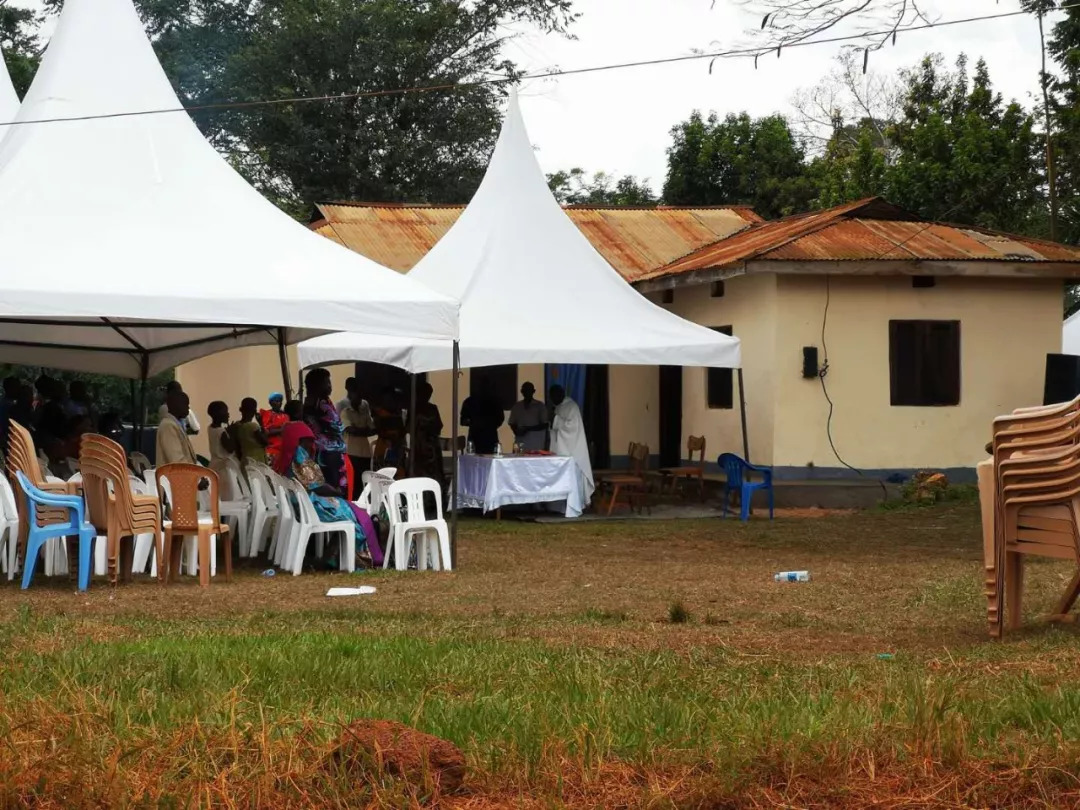老外在中国:乌干达的户外圣餐
China Daily英文微信 2018-09-14 17:14

I'm lucky enough to have been sent on a reporting trip last week to the beautiful country of Uganda, in central Africa. My China Daily colleague, Xiao Xiangyi, and I have been able to see some of the dams, farms, and industrial parks being built by Chinese companies and entrepreneurs.
我有幸于上周被派往非洲中部美丽的乌干达进行报道。《中国日报》的同事肖湘怡和我在此见到了一些中国的公司和企业家正在建造的大坝、农场和工业园区。
While driving back from the almost completed Isimba dam on the Nile River in the eastern part of the country, I saw a large crowd of people holding what looked like an outdoor festival in a village. Thinking I would just take a few photos, I asked the driver to stop.
当我们驱车从该国东部尼罗河上几近完工的伊辛巴水电站返回时,我看到一大群人似乎在村子里举行户外庆祝活动。我想拍几张照片,便请司机停车。
As I got closer, I could see that a Roman Catholic priest was holding an open-air mass, as lines of people waited for communion. I was surrounded by the incredibly beautiful African singing.
走近时,我看到一位天主教神父正在举行露天弥撒,人们排队等待圣餐,而我置身于非洲的美妙歌声之中。

A man named Daniel, who is a teacher in the local school, explained to me that this was the funeral of an elder of the village. He invited Xiangyi and me to join in. Everyone else there was so warm and welcoming to two strangers who had just crashed a funeral. We met the ladies of the village gathered together preparing food for a festival and visit by the local bishop, scheduled for the next day. We were invited to have lunch with the priest.
一位名叫丹尼尔的男子是当地学校的教师,他向我解释说,这是村里一位老人的葬礼。他邀请我和湘怡同去。对我们这两个闯入葬礼的陌生人,其他人表现得十分热情好客。我们看到村里的女人聚在一起,为明天的庆祝活动和当地主教的到访准备食物。我们受邀和神父共进午饭。
After the service, the whole village joined in procession through some woods and fields to the burial place of the obviously much loved and respected elder. The whole time, we were enveloped by that other-worldly singing — so beautiful that I teared up.
仪式过后,全村的人结队穿过几片树林和田野,前往这位显然深受爱戴和尊敬的长者的墓地。这期间,我们身边环绕着超凡脱俗的歌声,美到让我落泪。
Busana village is poor, even by Ugandan standards. It has no electricity and no running water. It does not even have a well or a reliable nearby source of clean water. Life is hard there. But, the people do have neighborliness, a feeling of brotherhood, which we seldom see in modern society.
即使按照乌干达的一般生活水平,布萨纳村也十分贫穷。这里没有电也没有自来水,甚至没有一口水井,或是一处可靠方便的干净水源。这里的生活很艰苦,但是,这里的人和睦友善,有一种兄弟情谊,这是我们在现代社会很少见到的。
Uganda reminds me very strongly of the southeastern part of the US when I was in elementary school, in the 1960s. It's not just that the landscape is similar — though it does look remarkably like north Florida, and the southern parts of Alabama and Georgia. If I didn't know where I was, I could easily be tricked into believing that I was driving down an old two-land highway in north Florida, not in central Africa.
乌干达这个国家让我回忆起上世纪60年代我上小学时的美国东南部。尽管乌干达看起来非常像北佛罗里达州、阿拉巴马州和乔治亚州的南部,但它们不仅仅是风景相似。如果我不知道自己所处何处,我甚至以为自己就在佛罗里达州北部沿着一条古老的双车道高速路行驶,而不是在非洲中部。
More importantly, Ugandan culture seems very similar to Southern US culture, both white and black, from 60 years ago. I remember going to Sunday "dinners on the ground", where everyone gathered to cook and eat and talk for hours. Sometimes, I hated it as a child — I remember just wanting to go home — but I can now see the importance of such gatherings for a community. I'm not sure whether people still do this in the US, but my visit to the Ugandan village brought back many memories of my childhood.
更重要的是,乌干达文化似乎和60年前的美国南部的白人文化和黑人文化都非常相似。我记得曾参加周日的“户外聚餐”,所有人都聚在一起做饭、吃饭、聊上几个小时。我儿时曾讨厌这个活动,我记得自己只想回家。但现在我能感受到这种聚会对于一个社区的重要性。我不确定在美国是否还有人这样做,但这次到访乌干达的村庄让我回想起许多童年的记忆。
In many material and social ways, there have been big improvements in the US since the 1960s. When I was a young child, few people had air-conditioning, TV was black & white with two channels, and, of course, computers were unheard of. Black people were discriminated against in horrible ways at that time.
从二十世纪六十年代起,美国在物质和社会方面都有了很大的进步。当我还是个孩子的时候,几乎没有人有空调,电视是黑白的,仅有两个频道,当然,人们还没听说过电脑。那时,黑人受到可怕的歧视。
But, in other ways, the culture has deteriorated.
但是,其他方面的文化已经退步。
The Amish are a religious group, mostly farmers in Pennsylvania and the Midwest states, who don't use modern technology. You can see their well-kept, productive farms if you visit the area around Lancaster, Pennsylvania. For a long-time, I had a hard time understanding their rules. They will not own a car, but they are sometimes willing to ride in one. They don't own telephones, but they will borrow a neighbor's in an emergency. Some Amish communities allow their members to ride bicycles, others forbid it.
阿米什是一个宗教团体,成员主要是宾夕法尼亚和中西部州中那些不使用现代技术的农民。如果你参观宾夕法尼亚兰开斯特地区,你可以看到管理良好的高产农场。很长一段时间,我都很难理解他们的规则。他们没有车,但他们有时愿意乘坐一辆车。他们没有电话,但他们会在紧急情况下借用邻居的电话。一些阿米什社区允许他们的成员骑自行车,其他社区禁止骑自行车。
It turns out that the logic of Amish rules is that they prohibit any technology that lessens the connectedness of the community. For example, they forbid car ownership, because all members of the community need to live close enough to help each other.
事实证明,阿米什规则的逻辑是,他们禁止任何减少社区连通性的技术。例如,他们禁止拥有汽车,因为社区的所有成员都需要住得很近才能互相帮助。
Ugandan culture is far from perfect. I'm told that there is a lot of violence and high rates of deadbeat fathers. But, everyone who visits here comments on the warmth and honesty of the Ugandan people.
乌干达文化远非完美。我听说这里有很多暴力问题和高比例的不负责任的父亲。但是,所有来过此地的人都说乌干达人民热情诚实。
Modern technology has brought lots of benefits. But, my visit to the "dinner on the ground" in a Ugandan village reminds me that we have lost something important, too.
现代技术带来了许多好处。但是,这次来到乌干达的村庄参加“户外聚餐”提醒我,我们也失去了一些重要的东西。
翻译:房宇馨(实习)
编审:董静 丹妮
音频编辑:焦洁
更多内容请关注“CHINA DAILY”微信公众号:

About author and broadcaster
David Blair writes for the international weekly editions of China Daily.

















 英语点津微信
英语点津微信 双语小程序
双语小程序